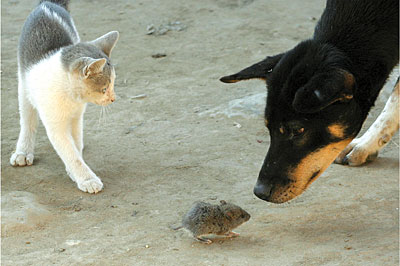 BIBI FUNYAL |
The year 2066 will go down in history as a time when Nepal became more dependent than ever before on the outside world. Diplomatically speaking, it was a year of uncertainty, difficulty and a lack of clarity.
Our immediate neighbours India and China and indeed the rest of the international community had hoped that after the restoration of peace in 2006, Nepal would reap the peace dividend, and there would be stability, development and the rule of law. Now that hope has been replaced by concern, if not fear, that the country may slide into an ethnic or sectarian conflict. Nepalis themselves are not just wondering if the constitution will be written on time, but whether it will be written at all.
Nepal may have been poor, but it was always regarded with affection in the international community. Nepalis were thought of as law-abiding and benign. Not any more.
At a diplomatic level, the national interest has been replaced by our selfish, clannish and partisan behaviour. Instead of selecting representatives to other countries on the basis of merit, character and competence they are chosen through inter-party swapping. This has not just weakened our foreign relations but also muddied Nepal's international reputation.
The past year saw a marked increase in the activity of foreign powers in Nepal. India has traditionally had a greater influence on Nepal, but China has also increased its interest, as manifest in the greater number of visits by Chinese dignitaries and security delegations.
When there is internal instability, outsiders will be more vigilant and active to safeguard their own national interest. India and China are global geopolitical rivals, and some of this competition is reflected in Nepal as well.
While the Indians have traditionally been active across the board, the Chinese were focused more on trade and economic cooperation. Both countries prefer to work behind the scenes to influence decisions. Recent years have shown that China may also be trying to exert influence not just to counter its traditional rival, but also to reflect its growing international stature.
Indo-Nepal relations are influenced less by what New Delhi wants and more by our leaders' beggarly conduct, based on selfish rather than broad national interests, even to the extent of inviting interference in interpersonal and intra party conflicts. The 'traditional' parties always behaved as if they couldn't get ahead without a nod from Delhi, and the new parties are also not immune to this attitude. As a result, in recent years, outside powers have also been consulting India in formulating their Nepal policy. Nepal is increasingly seen by other countries as a country that is incapable of taking care of itself.
For their part, the Europeans have always prioritised development and human rights. But they have been dismayed by Nepal's confusion and how political infighting has made even relatively easy activities much more difficult to implement. They thought they could be helpful to the peace process and constitution writing from afar, but even that is proving challenging.
It was because we couldn't manage our internal conflict that we had to invite the United Nations. We brought them here initially for six months, they have been here for two years. Until we have an internal agreement about army integration and the kind of military we want, no foreigner can give us suggestions, nor can we resolve those issues ourselves. Which is why we can neither keep UNMIN, nor can we do without them.
Not only do we have a weak foreign policy, it is looking like we don't have a policy at all. A country's foreign policy is the extension of its national interest, and it rarely changes with a change in government. But here we are assuring foreign powers that we will be their friend if they propel us individually or organisationally to power. Even those who use a different vocabulary sooner or later show that they are beholden.
Few had expected this country to be so dependent on the outside world as it is today. Which is why, instead of empathy, all we get from the international community is an attitude of pity. The challenge is within us, not beyond our borders.
Bhekh� B. Thapa, former foreign minister, was also Nepali Ambassador to the United States and India.
READ ALSO:
Prachanda's choice�- FROM ISSUE #497 (09 APRIL 2010 - 15 APRIL 2010)
Not impossible�- FROM ISSUE #497 (09 APRIL 2010 - 15 APRIL 2010)



